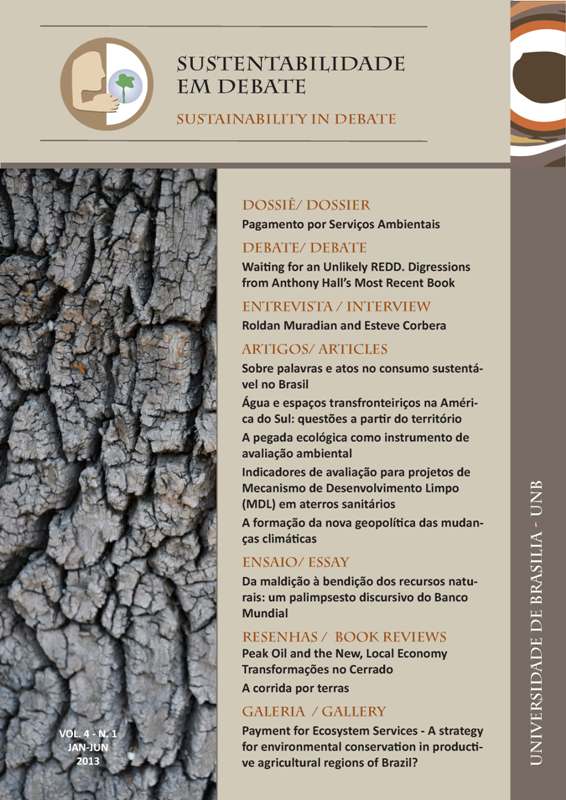Pagamento por Serviços Ambientais ”“
uma estratégia para a conservação ambiental nas regiões produtivas do Brasil?
DOI :
https://doi.org/10.18472/SustDeb.v4n1.2013.9216Mots-clés :
Conservação ambiental, Áreas agrícolas, BrasilRésumé
A população mundial deverá atingir 9 bilhões de pessoas em 2050 e colocará maior pressão sobre os recursos naturais para garantir o atendimento das necessidades nutricionais e conforto desse grande contingente populacional. Inúmeros investimentos em pesquisas agropecuárias, medicina, fontes energéticas, tecnologias de materiais, políticas para redução da pobreza e estratégias de desenvolvimento sustentável estão em curso para atender esta previsão. Ações para a conservação dos recursos naturais e dos serviços ambientais estão implícitas nas estratégias de desenvolvimento sustentável. Observa-se um aumento no número de políticas públicas implementadas, resultados alcançados, projetos em curso e pesquisas relacionados à conservação ambiental, comprovando a sua relevância atual e para o futuro.
Artigo bilíngue, escrito em português e inglês.
Téléchargements
Références
das Águas, pg. 5, 2008. Last Retrieved in: 04/23/2013. Available online at:
http://produtordeagua.ana.gov.br/Portals/0/DocsDNN6/documentos/
M A N U A L % 2 0 O P E R A T I V O % 2 0 -
%20PROGRAMA%20PRODUTOR%20DE%20%C3%81GUA.pdf
APPLETON, A. F. How New York City Used an Ecosystem Services Carried out
Through an Urban-Rural Partnership to Preserve the Pristine Quality of Its
Drinking Water and Save Billions of Dollars. 2002. Paper presented at the Meeting
of Forest Trends, Tokyo, November 2002.
ANTONIAZZI, L.B. Agricultura como provedora de serviços ambientais para a
proteção de bacias hidrográficas, Revista Tecnológica & Inovação Agropecuária,
junho de 2008, p. 52-63.
BENNETT, Genevieve, NATHANIEL Carroll, and HAMILTON Katherine. (2013). Charting
New Waters: State of Watershed Payments 2012. Washington, DC: Forest Trends.
Available online at: http://www.ecosystemmarketplace.com/reports/sowp2012.
DAILY, G.C. & MATSON, P.A. Ecosystem services: From theory to implementation,
PNAS, July 2008, p. 9455 - 9456.
DAILY, G.C. Nature’s Services: Societal Dependence on Natural Ecosystems. Washington,
DC: Island Press, 1997. p. 392.
HEAL, G. Nature and the Marketplace: Capturing the Value of Ecosystem Services.
Washington, DC: Island Press, 2000. p. 203.
GUEDES, F. B. & SEEHUSEN, S. E. Pagamento por Serviços Ambientais na Mata
Atlântica: lições aprendidas e desafios. Brasília: MMA, 2011, p. 272
KAREIVA, P. The future of Conservation ”“ Balancing the needs of people and nature.
The Nature Conservancy Magazine, Spring 2011, p. 38 ”“ 45.
MILLENIUM ECOSYSTEM ASSESSMENT. Ecosystems and Human Well-being:
Synthesis. Washington, D.C.: Island Press, 2005.
NRCS. Natural Resource Conservation Service ”“ United States Department of
Agriculture. Farm Bill, 2002 Summary of NRCS Conservation Programs, 2002.
Available online at: http://www.nrcs.usda.gov/programs/farmbill/2002/pdf/
ProgSum.pdf.
TERCEK, Mark & ADAMS; John S. Nature´s Fortune. How do Business and Society
Thrive by investing in Nature. The Nature Conservancy, Basic Books, 2013
VEIGA NETO, Fernando César da. A construção dos mercados de serviços
ambientais e suas implicações para o desenvolvimento sustentável no Brasil.
Thesis (doutoral) ”“ Universidade Federal Rural do Rio de Janeiro, Instituto de Ciências
Humanas e Sociais. 2008. p. 286.
WUNDER, S. Payments for environmental services: Some nuts and bolts. Jakarta:
Center for International Forestry Research, 2005, p 24. (CIFOR Occasional Paper.) v.
42.
SCHERR, S. et al. For Services Rendered ”“ The current status and future potential
of markets for the ecosystem services provided by tropical forests. International
Tropical Timber Association ”“ ITTO Technical Series nº 21, 2004.
Téléchargements
Publié-e
Comment citer
Numéro
Rubrique
Licence
SUSTAINABILITY IN DEBATE – Copyright Statement
The submission of original scientific work(s) by the authors, as the copyright holders of the text(s) sent to the journal, under the terms of Law 9.610/98, implies in the concession of copyrights of printed and/or digital publication to the Sustainability in Debate Journal of the article(s) approved for publication purposes, in a single issue of the journal. Furthermore, approved scientific work(s) will be released without any charge, or any kind of copyright reimbursement, through the journal’s website, for reading, printing and/or downloading of the text file, from the date of acceptance for publication purposes. Therefore, the authors, when submitting the article (s) to the journal, and gratuitous assignment of copyrights related to the submitted scientific work, are fully aware that they will not be remunerated for the publication of the article(s) in the journal.
The Sustainability in Debate Journal is licensed under Creative Commons License – Non-Commercial-No-Derivation Attribution (Derivative Work Ban) 3.0 Brazil, aiming at dissemination of scientific knowledge, as indicated on the journal's website, which allows the text to be shared, and be recognized in regards to its authorship and original publication in this journal.
Authors are allowed to sign additional contracts separately, for non-exclusive distribution of the works published in the Sustainability in Debate Journal (for example, in a book chapter), provided that it is expressed the texts were originally published in this journal. Authors are allowed and encouraged to publish and distribute their text online, following publication in Sustainability in Debate (e.g. in institutional repositories or their personal pages). The authors expressly agree to the terms of this Copyright Statement, which will be applied following the submission and publishing by this journal.









